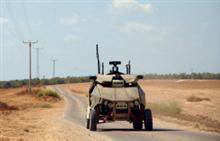
Head of robotics development: IDF uses robotic technology “to strengthen our forces’ operational capability and to facilitate the IDF’s ground superiority”.
Senior officers of the Defense Ministry’s Administration for the Development of Weapons and Technological Infrastructure (MAFAT) were among the participants and speakers in a conference on robotics and its potential for military use held at Tel Aviv University this week.
In a session dealing with the use of robotics for security and military purposes, Lt. Col. Gabi, head of MAFAT’s Robotics Division, delivered a general survey of ground robotics in the IDF.
“Our systems operate in coordination with existing weapons systems, so as to strengthen our forces’ operational capability and to facilitate the IDF’s ground superiority,” he stated.
Lt. Col. Gabi's lecture focused largely on the IDF's use of unmanned ground vehicles (UGVs). “These tools travel on a complex network of predetermined roads, and 90 percent of the time, that happens without the intervention of their operators,” he said.
Currently, the IDF uses UGVs – including the Israeli-developed Guardium – primarily within the Southern Command. UGVs are also used as observation tools along the Judea and Samaria security fence.
In addition to its UGVs, the IDF uses robots to identify and neutralize explosives. These robots utilize advanced capabilities – such as three-dimensional mapping in real time, identifying barriers and planning routes – so as to minimize the involvement of the operators and allow them to focus on other tasks.
“These actions are performed to allow for the opening of roads for the free and safe movement of military forces,” Lt. Col. Gabi explained.
Lt. Col. Gabi discussed various combat scenarios in which robots and UGVs can assist ground forces. “One of the [necessary tasks], for instance, is the clearing of roads from threats or explosives, and it makes perfect sense for this to be done as much as possible by unmanned systems,” he explained. “The UGVs can observe from closer and more dangerous points and draw fire toward themselves tactically.”
In urban combat scenarios, he noted, robotic technology can play a particularly important role in keeping soldiers safe. “The robots sometimes go in front of the forces, open challenging roads such as narrow alleys and assist logistically. A robot can help lighten a soldier’s burden, so that if the soldier is confronted with a battle, he or she can respond appropriately,” Lt. Col. Gabi stated.
He added that he IDF hopes to further upgrade such technology, with plans to begin using a new computerized system that will generate an approximate route for a UGV. The precise route, however, will be determined by the UGV itself.
“The [UGV] will be equipped with obstacle detection sensors, cameras and other tools, and it will be able to identify the barriers by itself and circumvent them,” he explained.
IDF
10.06.2013